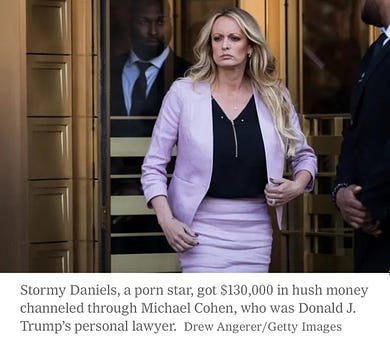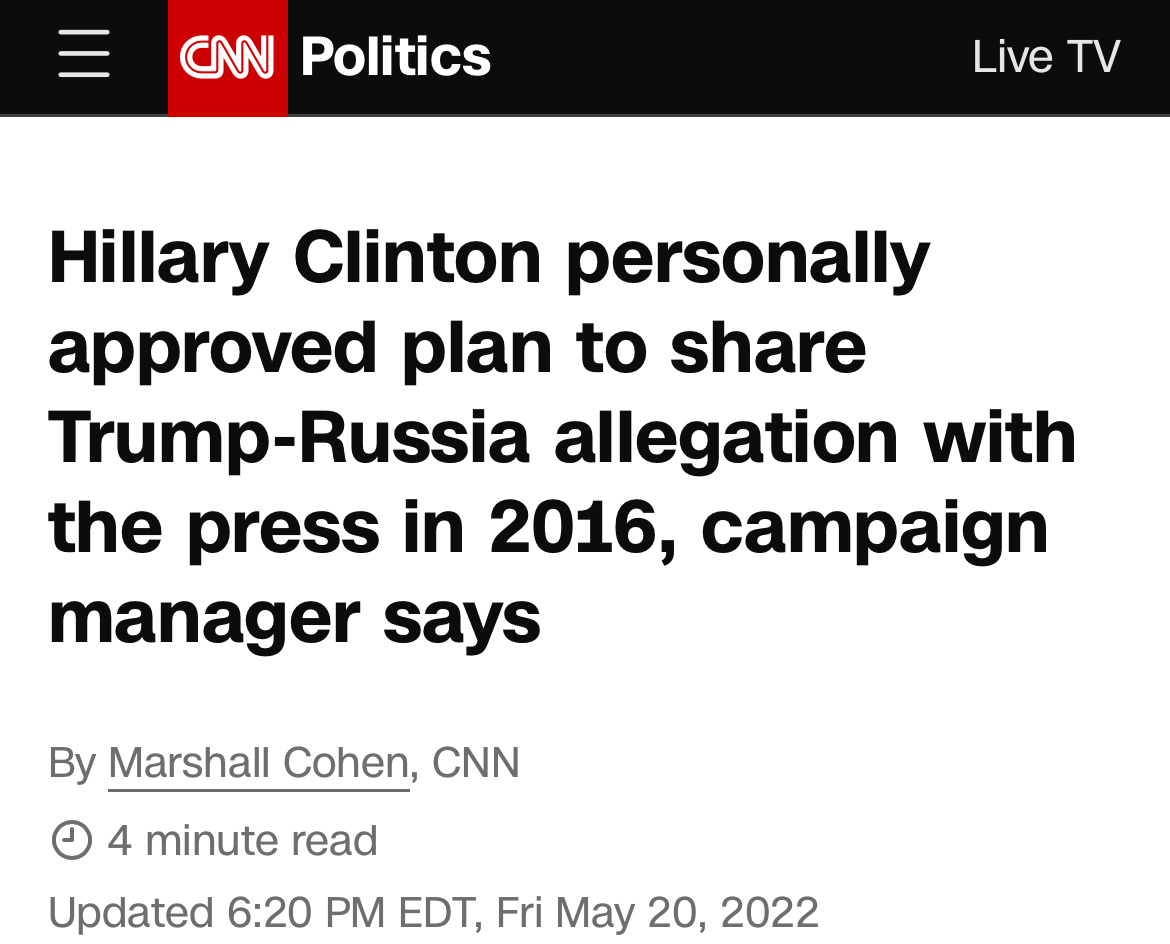"A criminal scheme to corrupt the 2016 presidential election."
That's the crime prosecutor Matthew Colangelo - a top official in Joe Biden's Justice Department until he joined the Manhattan district attorney's office to prosecute Donald Trump - claimed last week Trump had committed.
That "scheme" is why Trump faces 34 New York state felony charges for "falsifying business records," a crime that is normally a misdemeanor, Colangelo said in his opening statement to the Manhattan jury that will decide if Trump is guilty.
In mid-April, a Richard L. Hasen, a left-leaning expert on election law, wrote in the Los Angeles Times the New York charges "are so minor I don't expect they will shake up the presidential race."
Hasen was half-right. The charges are minor. But the way prosecutors are framing the case is not. Local Democratic prosecutors want to send Trump, a Republican, to prison, for a "crime" that comes down to beating Hillary Clinton in 2016.
Win or lose, their effort may destabilize the American legal system for decades.
(To understand exactly why, subscribe! This one is worth it, or your money back.)
In a 2009 book called "Three Felonies a Day: How the Feds Target the Innocent," Harvey Silverglate, a veteran defense lawyer, described how federal United States attorneys used vague laws to bring indictments against unpopular politicians and business executives.
The problem had worsened for decades as the federal criminal code expanded and prosecutors pushed its limits, Silverglate argued. He quoted Robert Jackson, a Supreme Court Justice who was also the chief American prosecutor in the post-World War 2 crimes trials at Nuremberg:
After explaining why a federal prosecutor must choose cases carefully and recognize that not every crime can be pursued, Jackson turned to the heart of his talk: '"If the prosecutor is obliged to choose his cases, it follows that he can choose his defendants."
Here one finds "the most dangerous power of the prosecutor: that he will pick people that he thinks he should get, rather than pick cases that need to be prosecuted."
Silverglate expressed less concern about state prosecutors. Tighter statutes restricted them and they focused on more obvious crimes, Silverglate wrote.
—
But the Trump indictment flips Silverglate's concern about the power of federal prosecutors and local politicians on its head.
In this case, local prosecutors, who answer only to local voters in a heavily Democratic county, aren't just stretching a state criminal statute to its limits. They are doing so explicitly to punish a Republican politician over his tactics in his race for president - the only truly national election in the United States.
To be clear, prosecutors have not charged Trump with committing any crime in 2016. He is charged only with technical violations of obscure bookkeeping laws in 2017.
In fact, the actual crime Trump supposedly committed is almost farcical in its unimportance. He supposedly misclassified $420,000 in expenses in internal accounting records as "legal services" when they were actually reimbursements for payments that his lawyer Michael Cohen had made on his behalf.
But the 2016 election underlies the indictment, and not in a subtle or implicit way, as the prosecution has made clear.
The government's star witness during the trial's first week was David Pecker, the former publisher of the National Enquirer. Pecker testified about his efforts to improve Trump's image in the years before the 2016 election.
Pecker paid Karen McDougal, a woman who claimed she had had an affair with Trump, $150,000 to buy the exclusive rights to her story. Then he buried it, a practice called "catch and kill."
Seamy, for sure. And in 2021, Pecker agreed to pay $187,500 to settle a Federal Election Commission investigation into whether the payment to MacDougal was an illegal campaign contribution.
But Trump is not charged for anything related to the National Enquirer's payments to MacDougal. Instead, prosecutors used Pecker's testimony to make the case that Trump worried that publicity about his affairs with MacDougal and Stormy Daniels, a porn star, might hurt his campaign in 2016.
—
(Don't do the porn star if you can't do the time?)
—
Assume the prosecutors are correct. Assume Trump's only motive for hiding his affairs was to improve the chances he would win the 2016, that he didn't want to keep them secret for some other reason. Assume also that he actually coordinated with Pecker and the National Enquirer to hide MacDougal's story.
The correct response remains, So what? Why on earth is Trump on trial?
In 2016, Hillary Clinton's campaign used campaign funds to pay for the infamous "Steele dossier," the research report that falsely linked Trump to Russia. This is not a conspiracy theory. In 2022, Clinton's campaign and the Democratic National Committee paid a $113,000 fine to the FEC to settle an investigation into the payments.
Clinton's campaign then worked with friendly news organizations to plant stories based on that research.
—
(For once, you can trust CNN)
—
And Clinton's campaign had a relationship with elite media outlets like the New York Times at least as good as the one Trump had with the National Enquirer. (Famously, Amy Chozick, the Times's lead reporter on the Clinton campaign, wrote that she'd cried the day after Trump beat Clinton in 2016. Pecker and Trump may be friends, but it is hard to imagine Pecker shedding tears if Trump had lost.)
If Donald Trump is being indicted for his 2016 shenanigans, why isn't Hillary Clinton?
To be clear, I am not suggesting anyone should prosecute Clinton for the role her campaign played in generating the Steele dossier or spreading it around.
What I am saying is that, as Finley Peter Dunne famously said in 1895, "Politics ain't beanbag." Any candidate worthy of the name will want to win badly, and will do everything possible to portray himself in the best possible light and his opponent in the worst. That's true in every election, much less one where the world's most powerful office is at stake.
For local prosecutors to attempt to turn what are most technical legal violations into felonies on the basis that Donald Trump wanted to keep his private affairs private in a presidential election is a dangerous overreach.
—
The fact Trump is leading Joe Biden in this year's presidential race makes the situation even worse.
The New York Times argued convincingly this weekend in a long piece (paywalled) that Trump's view of the United States and the American justice system has darkened considerably since 2016.
But what the Times didn't acknowledge is that Trump now has every reason to view American law as hopelessly politicized and prosecutors as targeting him. Whatever the strengths and weaknesses of the three other indictments Trump faces, the Manhattan case is a travesty, a poison pill that no amount of sugarcoating can hide.
Perhaps recognizing this uncomfortable truth, the times ran an (paywalled) op-ed today from a former prosecutor in the manhattan district attorney's office claiming that the indictment "is not really about election interference, nor is it a politically motivated attempt to criminalize a benign personal deal. Boring as it may sound, it is a case about business integrity."
This is nonsense, of course, and not just because no similar case has ever been charged as a felony. Colangelo's own words to the jury belie any effort to normalize this case.
Win or lose, the manhattan district attorney's office has made a terrible mistake. At best, it has opened the way for partisan local prosecutors in all 50 states to look for any excuse to interfere in federal elections.
And if Trump wins this fall, he will be in a position to unleash federal law enforcement on his opponents. He shouldn't, of course. [N.S.: Why not?! He'd be a fool not to!] But after this indictment, even a man far more patient and forgiving than Donald Trump would have a hard time not wanting revenge.



3 comments:
So put him in prison for something he MIGHT do as President?(As you say N.S.,Trump SHOULD nail some Dems to the wall,for all the false charges,libelous innuendo and waste of money they have frivolously thrown at Trump the last many years.)
--GRA
KEY TRUMP WITNESS SAYS,"DONALD TRUMP DID NOT DIRECT PAYMENTS TO MICHAEL COHEN."
GRA:If the jury is impartial,he should be exonerated.
(ZH)A witness in former President Donald Trump’s New York “hush money” trial on Monday appeared to confirm his attorneys’ claims that payments at the center of the case were legal expenses and that he was not personally directed by the former president to make those payments.
Former Trump Organization controller Jeffrey McConney testified Monday that payments that were sent to former attorney Michael Cohen were legal expenses, confirming defense attorneys’ arguments.
“Michael Cohen was a lawyer?” Trump defense attorney Emil Bove asked Mr. McConney. “Sure, yes,” he replied.
“And payments to lawyers by the Trump Organization are legal expenses, right?” asked Mr. Bove. “Yes,” said Mr. McConney.
Later, Mr. McConney said that President Trump and Trump Organization official Allen Weisselberg never told him to log the payments to Mr. Cohen as legal expenses.
“President Trump did not ask you to do any of the things you just described?” the attorney then asked. “He did not,” Mr. McConney replied.
“And as far as you know, President Trump did not ask anyone to do those things?” Mr. Bove continued. “In none of the conversations that you had with Weisselberg, did he suggest that President Trump had told him to do these things?” he also asked.
“Allen never told me that,” Mr. McConney said.
Little Contact With Cohen
Mr. McConney said his interactions with Mr. Cohen were “minimal.” He said that other than emails about invoices, he never spoke to Mr. Cohen about the reimbursement arrangement.
--GRA
"American law as hopelessly politicized and prosecutors as targeting him"
Not only Don but anyone associated with him even if even in the most peripheral manner.
Post a Comment